- Calls to this hotline are currently being directed to Within Health, Fay or Eating Disorder Solutions
- Representatives are standing by 24/7 to help answer your questions
- All calls are confidential and HIPAA compliant
- There is no obligation or cost to call
- Eating Disorder Hope does not receive any commissions or fees dependent upon which provider you select
- Additional treatment providers are located on our directory or samhsa.gov
The Fear of Eating in Public (Deipnophobia): How to Address It

Deipnophobia is a form of social anxiety disorder, manifesting as the fear of eating in front of others.
The condition can be difficult or even debilitating to deal with every day. Your fear of eating in front of others can severely restrict your social life, the choices you have, and the decisions you make.
But it doesn’t have to be forever. Therapy can help you overcome this fear, reenter the social world, and maybe even feel less alone.
What Is Deipnophobia?
While there’s no official count of how many people struggle with deipnophobia, anxiety disorders generally impact about 12% of the population.1
If you experience this anxiety as the fear of eating in public, the angst you feel may not necessarily be driven by food. The fear of eating in public is also often connected to anxiety over how others view you eating.
These particular concerns can be rooted in several different feelings, experiences, and co-occurring mental health conditions. And if left unaddressed, deipnophobia can negatively impact your social life, which may further impact your overall mental health.
Who Struggles with Deipnophobia?
While anyone can experience deipnophobia, some groups, in particular, may be more sensitive to this type of anxiety.
Those who struggle with or are recovering from an eating disorder often have difficulty eating around others. They may be anxious that their loved ones will ask questions about their eating, that they will be pressured to eat, or that they will be judged for their behaviors around eating.
It’s also not uncommon for people with larger bodies to experience anxiety around eating in public. Unfortunately, many people in larger bodies face societal discrimination around their appearance and behaviors, which could contribute to their fears or unease.
And those who have experienced trauma may also have particular sensitivity around mealtimes. Eating with someone can be an intimate experience and represent a sensory minefield for people recovering from physical or psychological abuse. The sights or sounds of a shared meal could reawaken memories that trigger panicked feelings.
What Does Deipnophobia Look Like?
People with deipnophobia experience extreme stress if forced to eat in front of others. They may grow uncomfortable or panicked even at the thought of a shared meal.
Case studies reveal people struggling with deipnophobia may encounter similar symptoms to a panic attack, which could lead to trouble chewing and swallowing and increase the odds of choking.2
Other panic attack symptoms that may appear when you experience deipnophobia include:3
- Chest pain
- Sweating
- Dizziness
- Dry mouth
- Headaches
- Hot or cold flashes
- Nausea
- Numbness
- Rapid heartbeat
- Shaking
- Shortness of breath
Treatment for Deipnophobia
Thankfully, the specific nature of deipnophobia makes it relatively easy to treat, with a number of options available to those seeking help for the condition.4
Therapy
Several types of therapy can help people combat the kind of fear stirred up by deipnophobia.
Cognitive behavioral therapy (CBT) teaches you new ways to think about, react to, and behave during situations that make you feel anxious.5 Your doctor might suggest certain puzzles or assign “homework” that can help change the way you think—and, eventually, act—about certain situations.
Exposure therapy can also be helpful. Through this course of treatment, you’ll be slowly exposed to triggering experiences, while a doctor will help walk you through the source of your anxiety and teach you coping strategies that may help.
These treatments can take time, but you’ll emerge with several tools to cope with your deipnophobia.
Medication
Some people with anxiety disorders benefit from selective serotonin reuptake inhibitors, a class of anti-anxiety medications.1
While many doctors recommend medication as a supplemental aspect of recovery, it may help ease chemical imbalances and allow you to gain control over your eating habits while you continue working through therapy.

How to Talk About Your Deipnophobia
Another useful option for dealing with stressful scenarios may be opening up to trusted friends, family, and loved ones.
You’re by no means required to tell anyone in your personal life about your experience with deipnophobia. But sharing your struggle with people you know and trust could help alleviate some stress and help you find allies and support.
When someone you trust asks you to share a meal, you can explain how the scenario makes you feel. For example, you can talk about the anxious thoughts or physical feelings these situations cause and explain that eating with others makes you uncomfortable.
Finding Help for Deipnophobia
Whether or not you feel comfortable talking to loved ones about your experience, seeking treatment for your condition can help.
If there is someone in your life who you trust, you can ask them to help you practice eating in public. It’s not necessary to push yourself into going all-out and having dinner with a large group of people to combat this anxiety. You can start slowly by getting something to go, ordering a snack or drink from a cafe, or only ordering an appetizer to begin.
If you’re not comfortable sharing your experience yet, you can seek help from a trained medical professional. These people will be able to help you combat the anxiety you’re feeling and offer strategies for overcoming these uncomfortable feelings.
Resources
- Das A, Holland J, Flynn V, Thapa PB (2022). Deipnophobia: A Case of Social Anxiety Masquerading as Eating Issues. The Primary Care Companion for CNS Disorders; 24(2):21.
- Shimbun N. (2022, March 21). Deipnophobia: Understanding the Fear of Dining With Others. The Japan Times. Accessed July 2022.
- Symptoms: Phobias. (2018, October). National Health Service. Accessed July 2022.
- McCabe R, Bui E. (2020). Pharmacotherapy for Specific Phobia in Adults. UpToDate. Accessed July 2022.
- Social Anxiety Disorder: More Than Just Shyness. (2022). National Institute of Mental Health. Accessed July 2022.
Published March 7, 2023

The EatingDisorderHope.com editorial team comprises experienced writers, editors, and medical reviewers specializing in eating disorders, treatment, and mental and behavioral health.

